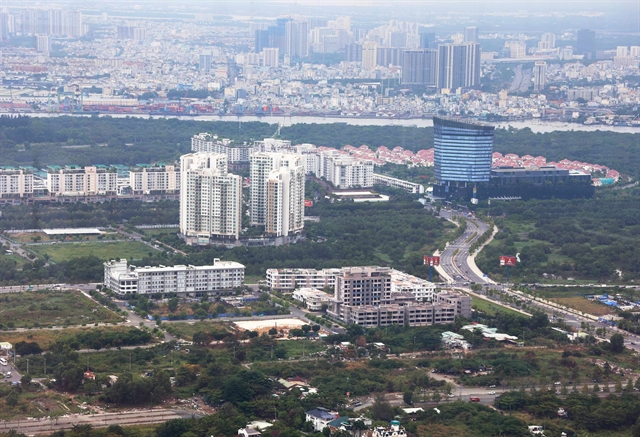The local real estate market is currently witnessing a rapid recovery, fuelled by factors such as loose monetary policy, lower interest rates and developments in infrastructure and planning.

HÀ NỘI — In addition to genuine demand for land and housing, speculative activities are driving up prices and creating a 'land fever' that may significantly increase risks for investors in the domestic real estate market.
This market is currently witnessing a rapid recovery, fuelled by factors such as loose monetary policy, lower interest rates and developments in infrastructure and planning.
Land speculation has become a more pronounced trend in areas with developing infrastructure and merger plans, particularly in suburban regions or areas on the outskirts of major cities like Hà Nội and HCM City.
While this may seem like an opportunity for investors, experts caution that speculative actions could lead to inflated prices and market volatility.
The Việt Nam Association of Realtors (VARS) has urged investors to thoroughly research price levels, planning progress and the real growth potential of the areas that they are considering for investment. In particular, factors such as liquidity and the ability to generate cash flow should be prioritised.
At present, one of the primary risks for investors is the influence of speculative activities. With the Government’s efforts to ease legal restrictions, many real estate projects are being restarted, which could lead to further price hikes, particularly in regions with plans for mergers or infrastructure upgrades.
As more investors flock to these areas, they risk being swept up in 'land fever', in which prices become detached from actual value, driven more by speculation than real growth potential, according to VARS.
Land prices in these areas have already been increasing rapidly, often reaching new peaks. This has led to a situation where investors are purchasing land based on rumours rather than careful evaluation, exposing them to high risks.
The growing interest in land surrounding major cities like Hà Nội and HCM City is also being driven by the high cost of capital investment in these urban centres.
As the cost of land in large cities rises, many investors are turning to suburban areas or regions with significant potential for future development.
For example, areas on the outskirts of Hà Nội, such as Ninh Bình, Lạng Sơn, Bắc Giang and Hải Dương, are seeing increased demand, as well as southern regions including Bình Thạnh, Long An and Bình Dương, where major infrastructure projects are underway.
Despite these emerging opportunities, general director of Đất Xanh Miền Bắc Vũ Cương Quyết has urged investors not to expect unrealistic returns.
While some areas, such as Bắc Ninh, may appear promising due to ongoing investment, the announcement of a merger is unlikely to drastically change the region's economic landscape.
As such, investors should focus on the long-term potential of their investments and ensure that the areas they choose to invest in have sound infrastructure and solid economic foundations.
Experts agree that the key to avoiding the pitfalls of 'land fever' is careful due diligence. Investors need to be aware of the actual price levels in the areas they are targeting, and should have a clear understanding of the progress of any planning or infrastructure projects.
Moreover, choosing properties in areas with concrete development plans and visible infrastructure projects will offer a safer investment compared to regions where prices are inflated due to rumours or speculation.
Liquidity is another critical factor to consider. Investors should focus on properties that offer potential for steady cash flow, whether through rental income or appreciation in value.
Properties in areas that are actively developing and where the Government is implementing policies to attract residents and businesses are likely to offer more stability than areas driven by speculative hype.
To ensure the market develops in a transparent and sustainable manner, VARS urges the Government, real estate brokers and trading floors to cooperate closely.
The Government should continue to enforce regulations and strengthen market supervision, including promoting transparency in real estate data and market information. This would help avoid price manipulation and prevent land fever from distorting the market.
Real estate brokers and trading floors also have an important responsibility to uphold legal standards and avoid participation in speculative practices. — VNS





